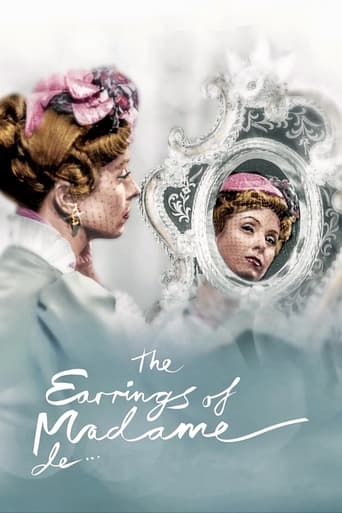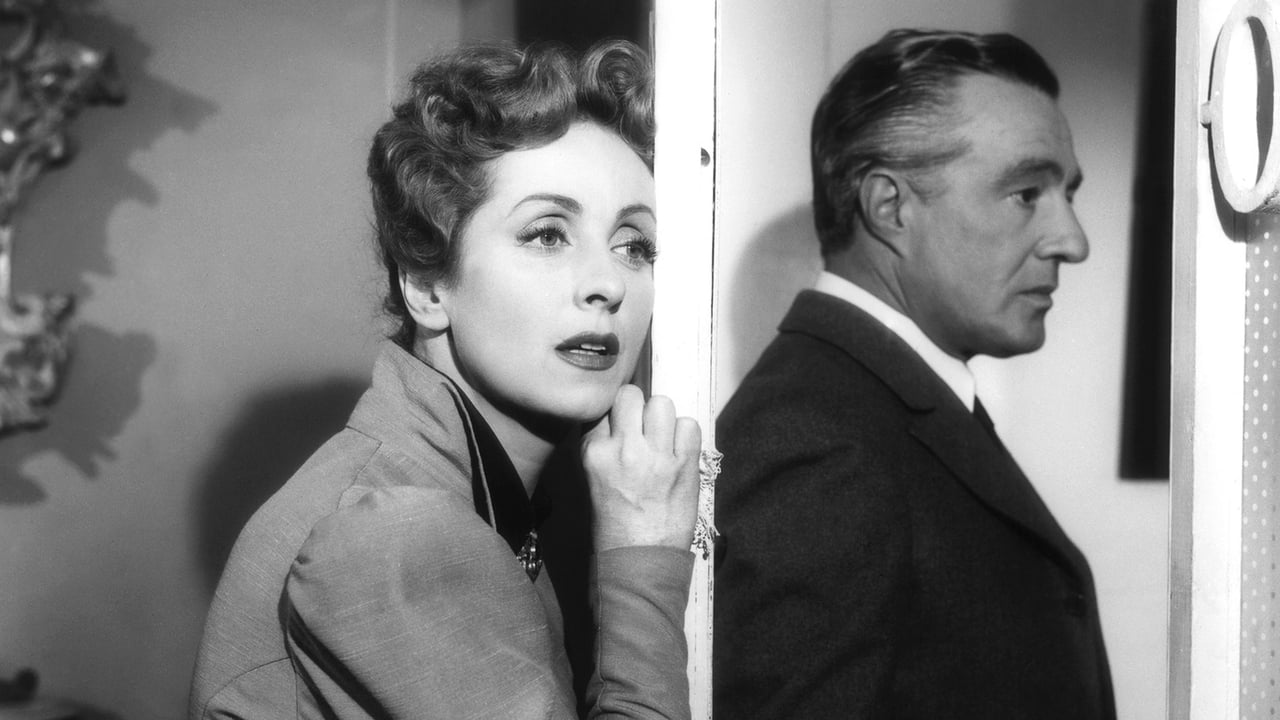happytrigger-64-390517
As a cinema lover, I've always admired Max Ophüls with his romantic movies and his fantastic and vertiginous camera movements. And his very very best is of course "Madame de ..." which can also be considered as one of the best movie of Danièle Darrieux in her high society woman character. Two legends working together.And very sadly, I learned today that DD passed away, just a few days after Jean Rochefort (they played together in "Du Grabuge Chez Les Veuves" and "Le Dimanche de la Vie" which I recommend, DD is very caustic in this one). She played in so many great movies since 1931, what a voice, what a silhouette, what a face. So long DD.
clanciai
The two top gallant gentlemen of the cinema as rivals of its most beautiful woman, both loving her beyond expression in the subtlest possible intrigue of fate as unpredictable as an improvised thriller in which the writer himself has no idea of where the mechanics of destiny will lead him or the puppets of his tale, a labyrinth of love leading everywhere but out of it, filmed with all the refined expertise of perhaps the greatest film director of all, using his constantly moving camera for an overwhelming constant flood of beauty and poetry. This is simply incredible. You can see every film of his again and again forever, since their richness of details and amounting complications of human feelings always expressed by hints and understatements are unfathomably without end. Danielle Darrieux. great already in the 30s and chosen by most cinema lovers as the one outstanding film queen of beauty, is 99 today (1st of May 2016), while her warm beauty dominates her every film forever. Charles Boyer is always reliably excellent and here nobler than ever as the husband, while Vittorio de Sica perhaps makes his most sincere performance as the passionate lover, just as honestly romantic as Charles Boyer's absolute nobility couldn't be more convincing. What about the story, then, actually seemingly superficially a trifle of unavoidable complications resulting from white lies, but the miracle is how this mere miniature of an episodic detail is aggrandized into a love drama of more than epic proportions involving all kinds of storms of a thrilling melodrama. Comedy or tragedy? No, just a human documentary charting an ocean of the complications of being just human. To this comes Oscar Straus' delightful music adorning the masterpiece with a golden frame of tenderness, as if the composer adored the poor victims of this train of complications resulting from the mere trifle of a white lie. Is anyone committing any mistake at all to deserve all this agony of unnecessary self-torture resulting from mere complexes of feelings? No, in all this towering guilt no one is to blame for anything. They are all as innocent as children getting mixed up in a game that goes beyond them. Maybe the tragedy could have been avoided, but then the French are as they are with a penchant for an irrevocably undeniable mentality of Crime Passionnel. There Max Ophuls finds a dead end of his story and film, which perhaps was necessary, or else a story like this could never have ended. In fact, there was a continuation, but Ophuls cut it out, forcing himself to avoid overdoing it. The masterpiece just couldn't be driven further.Still, it's not his best film. But it's a perfect example of the virtuosity of his art.
blanche-2
I keep wondering where these amazing treasures, such as "The Earrings of Madame De..." have been all my life. This 1953 Max Ophuls film is magnificent in every respect - direction, acting, script, photography, with just the right touch of humor for what is, in essence, a tragic love story.It is 19th Century France. Danielle Darrieux is "Comtesse Louise De..." who in the beginning of the film sells a pair of heart-shaped earrings given to her by her husband, General Andre De... (Charles Boyer), as she has some expenses that she must meet. She trusts the jeweler's confidentiality. During a production of "Orfeo e Euridice," she announces to Andre that she's left her earrings somewhere. However, the jeweler tells Andre about the sale; Andre buys back the earrings and gives them to his girlfriend, whom he's dumping. When she needs gambling money, she sells them, and they are purchased by Baron Donati (Vittorio di Sica) as a gift for his new girlfriend - the Comtesse Louise! The earrings are a symbol of fate, the volatility of love, and the meaning of possession. The General is a possessive man, but he wants to have his cake and eat it, too, presenting these beautiful earrings to two women. The Comtesse doesn't want the earrings when they're from her husband; when they're from her lover, she's desperate to find a way that she can wear them and resorts to manipulation in order to do so. For Donati, they're a symbol of romantic love, but when he realizes that his beloved is flesh and blood and not totally truthful, he becomes disillusioned.All of this is done with looks, a word, a suggestion, a dance, the placement of furniture (the General and Comtesse sleep in the same room, miles apart) - nothing too overt. The delicacy and subtlety of the film is magical.The beautiful Danielle Darrieux, now 92 and with a film coming out next year, does a beautiful job as the flirtatious Louise, who becomes more involved than she planned - she goes from flirty to passionate and finally to desperate. DeSica is a handsome and charming suitor; and Boyer has just the right amount of edge on his performance. He's not the monster of "Gaslight," but an authoritative Frenchman who doesn't want a scandal and becomes annoyed when he sees that his wife's romance has gone a little too far.With its fluid photography, pace, and romance, "The Earrings of Madame de..." is a true gem. No other way to describe it.
WinterMaiden
There is little of praise I can add to what others have said. I would like to address the comments of those who don't like the film because they find Louise unworthy of their admiration or sympathy. (There are two threads on the board that raise the same objection, and one quotes a review that calls her a "dick.")Do you feel sympathy for Humbert Humbert? Or for Emma Bovary? Or for Anna Karenina? Or for the Vicomte de Valmont? People are certainly free not to like the directing style of Max Ophuls or the performance styles of his actors. But in the negative reactions to this film, and especially to the character of Louise, I detect a strong whiff of anachronistic response, and an inability to see the film in the context of its time and place, not to mention the characters in the context of their society. It also seems to me that many people have a sort of high school notion that you have to find a character admirable in order to feel sorry for her. Or, for that matter, that you have to feel sympathy for a character in order to be moved by her story.The irony of "Madame de. . ." is that it turns out that the character with the deepest and most constant emotions is the General, who has concealed the depth of his feelings for Louise because it is not the fashion to be in love with one's own wife. He follows the rules; he has mistresses; he doesn't mind Louise's lovers too much as long she too follows the rules. He can't handle it when she strays outside the lines, and it is HIS behavior, not hers, that finally ruins them all.The art of "Madame de..." is that the lush setting and sense of a society that lives on ersatz emotion prepares us to be caught up in the ecstasy of Louise's immolation as the emotions become real. That doesn't mean that the Baron is really the Romeo to her Juliet, or that (artistically speaking) he needs to be. In her review of "The Story of Adèle H.," Pauline Kael comments on what a pathetically inadequate object of obsession Lt. Pinson constitutes. Indeed, late in the film, when Adèle passes him on the street, she doesn't even notice him. The Baron is also a rather bland love object, and it is true that we have little sense of how far their affair has progressed, or if he would even want Louise to leave her husband for him. (That is not, after all, how the game is played.) In the Garbo "Camille," Robert Taylor's Armand is utterly unworthy of her, and I've never seen a version of "Anna Karenina" where the Vronsky seemed worth ruining oneself over--or who, for that matter, really seemed to WANT Anna to leave her husband for him.Louise's tragedy is that her understanding of the game, of which she is a typically petty and only somewhat skilled player (she has, after all, already skirted the edge of ruin by falling deeply into debt), does not prepare her for actual love. Once there she tries to behave well, but events spiral out of the control of all the characters once they are outside of the predictable game. We don't even have to see a redemption in the completeness with which she gives herself up to her love, or her making herself ill over it; her behavior is by and large selfish and unconcerned with the feelings of anyone other than herself. If not a redemption she does have a kind of saving grace: she doesn't ask for pity or understanding (although she does ask for forgiveness), and she does achieve a kind of understanding of herself when she admits near the end that she is hopelessly vain. What makes "Madame de. . ." a great film, though, is how we see the General, Louise, and even the bland Baron become human as they step outside the rules of the game, and the way in which the art of Ophuls prepares us for the exaltation of Louise's destruction. You don't have to pity her to be moved by the emotion of it. You may even find a dreadful comedy in it, as one does with Humbert. Humbert knows how unworthy he is as a figure of tragedy; Valmont realizes with a bitter sense of irony that he has destroyed himself with his own clever pettiness. Louise lacks those levels of insight, as well as their degree of villainy, but her lack of credentials to be a great heroine is itself moving. At the end, when she finally destroys herself, it seems to be, at last, in her first more-or-less-selfless gesture-- ambiguous, though, as everything in Ophuls is. Perhaps Renoir (the allusion to him above being deliberate) could have made these characters more sympathetic, or made us feel more tenderness for unsympathetic characters. (Renoir could make us feel tenderness for a rock.) But Ophuls is not as purely focused on the human heart as Renoir; he always sees the absurd social animal, as well. I think it is more appropriate with Ophuls to have that distancing, as we have when we read "Madame Bovary."


 AD
AD




